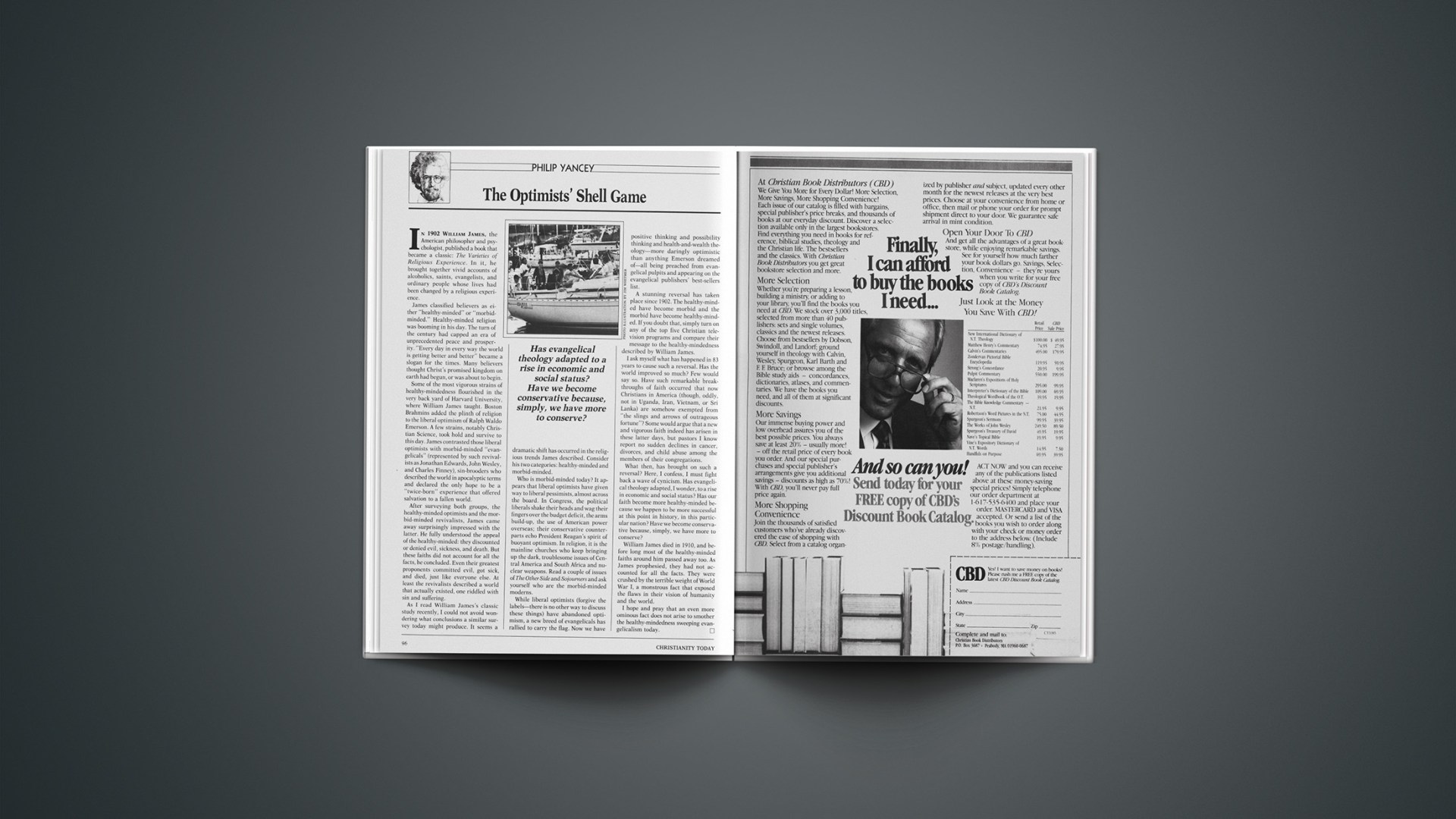In 1902 William James, the American philosopher and psychologist, published a book that became a classic: The Varieties of Religious Experience. In it, he brought together vivid accounts of alcoholics, saints, evangelists, and ordinary people whose lives had been changed by a religious experience.
James classified believers as either “healthy-minded” or “morbid-minded.” Healthy-minded religion was booming in his day. The turn of the century had capped an era of unprecedented peace and prosperity. “Every day in every way the world is getting better and better” became a slogan for the times. Many believers thought Christ’s promised kingdom on earth had begun, or was about to begin.
Some of the most vigorous strains of healthy-mindedness flourished in the very back yard of Harvard University, where William James taught. Boston Brahmins added the plinth of religion to the liberal optimism of Ralph Waldo Emerson. A few strains, notably Christian Science, took hold and survive to this day. James contrasted those liberal optimists with morbid-minded “evangelicals” (represented by such revivalists as Jonathan Edwards, John Wesley, and Charles Finney), sin-brooders who described the world in apocalyptic terms and declared the only hope to be a “twice-born” experience that offered salvation to a fallen world.
After surveying both groups, the healthy-minded optimists and the morbid-minded revivalists, James came away surprisingly impressed with the latter. He fully understood the appeal of the healthy-minded: they discounted or denied evil, sickness, and death. But these faiths did not account for all the facts, he concluded. Even their greatest proponents committed evil, got sick, and died, just like everyone else. At least the revivalists described a world that actually existed, one riddled with sin and suffering.
As I read William James’s classic study recently, I could not avoid wondering what conclusions a similar survey today might produce. It seems a dramatic shift has occurred in the religious trends James described. Consider his two categories: healthy-minded and morbid-minded.
Who is morbid-minded today? It appears that liberal optimists have given way to liberal pessimists, almost across the board. In Congress, the political liberals shake their heads and wag their fingers over the budget deficit, the arms build-up, the use of American power overseas; their conservative counterparts echo President Reagan’s spirit of buoyant optimism. In religion, it is the mainline churches who keep bringing up the dark, troublesome issues of Central America and South Africa and nuclear weapons. Read a couple of issues of The Other Side and Sojourners and ask yourself who are the morbid-minded moderns.
While liberal optimists (forgive the labels—there is no other way to discuss these things) have abandoned optimism, a new breed of evangelicals has rallied to carry the flag. Now we have positive thinking and possibility thinking and health-and-wealth theology—more daringly optimistic than anything Emerson dreamed of—all being preached from evangelical pulpits and appearing on the evangelical publishers’ best-sellers list.
A stunning reversal has taken place since 1902. The healthy-minded have become morbid and the morbid have become healthy-minded. If you doubt that, simply turn on any of the top five Christian television programs and compare their message to the healthy-mindedness described by William James.
I ask myself what has happened in 83 years to cause such a reversal. Has the world improved so much? Few would say so. Have such remarkable breakthroughs of faith occurred that now Christians in America (though, oddly, not in Uganda, Iran, Vietnam, or Sri Lanka) are somehow exempted from “the slings and arrows of outrageous fortune”? Some would argue that a new and vigorous faith indeed has arisen in these latter days, but pastors I know report no sudden declines in cancer, divorces, and child abuse among the members of their congregations.
What then, has brought on such a reversal? Here, I confess, I must fight back a wave of cynicism. Has evangelical theology adapted, I wonder, to a rise in economic and social status? Has our faith become more healthy-minded because we happen to be more successful at this point in history, in this particular nation? Have we become conservative because, simply, we have more to conserve?
William James died in 1910, and before long most of the healthy-minded faiths around him passed away too. As James prophesied, they had not accounted for all the facts. They were crushed by the terrible weight of World War I, a monstrous fact that exposed the flaws in their vision of humanity and the world.
I hope and pray that an even more ominous fact does not arise to smother the healthy-mindedness sweeping evangelicalism today.










